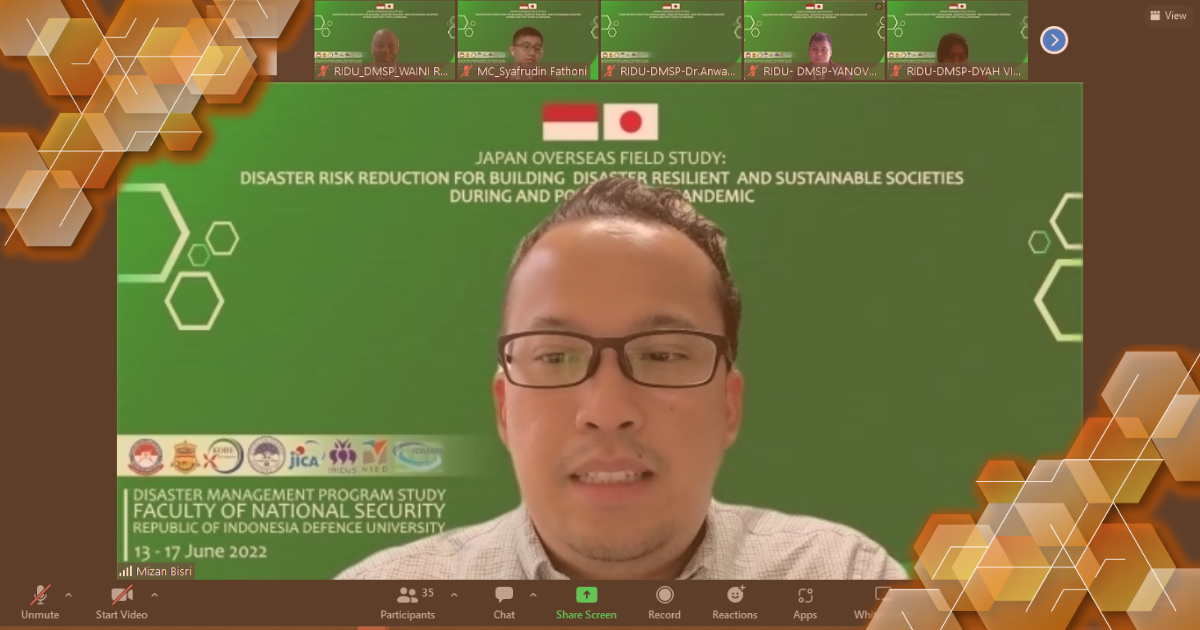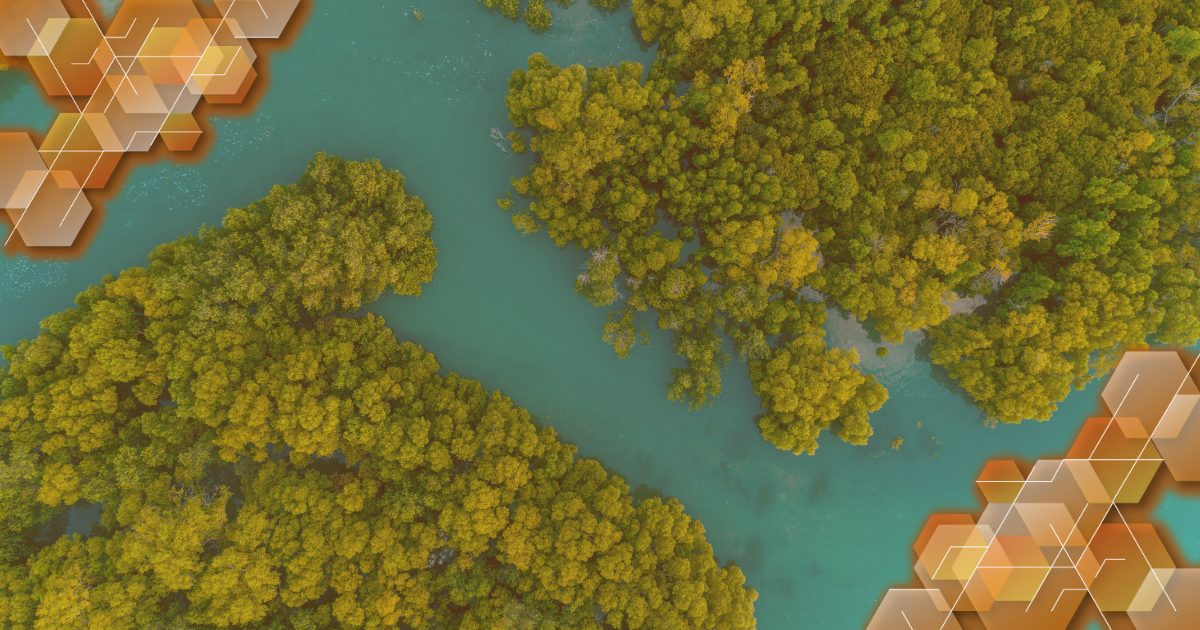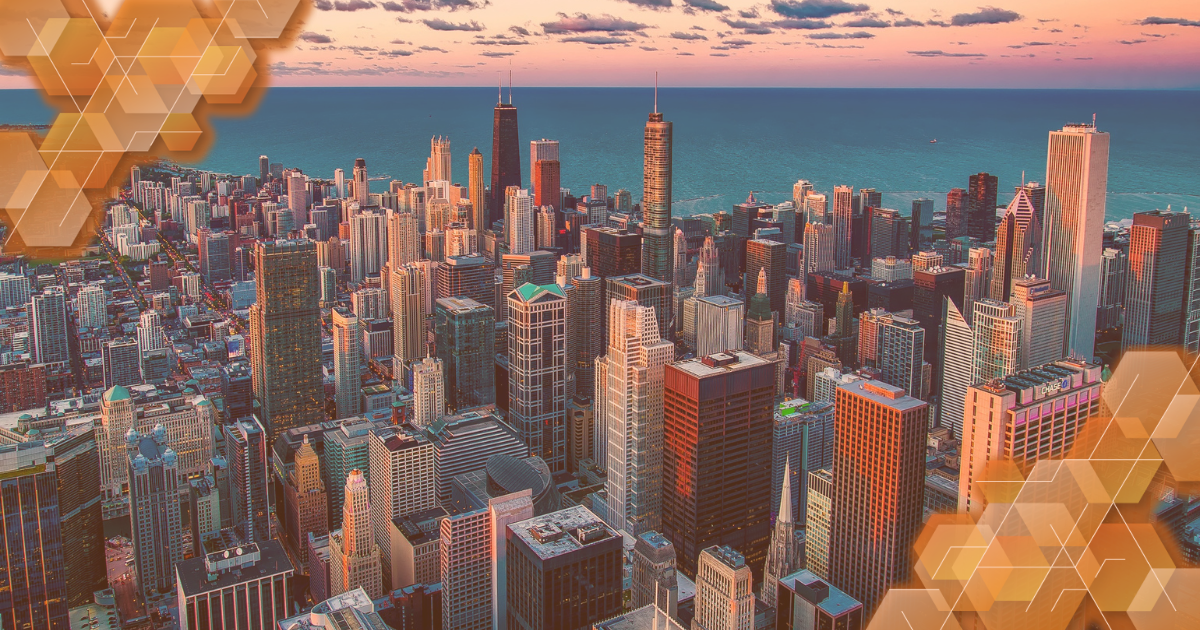
Webinar : The Transfer of Knowledge, Technology And Expertise for Disaster Risk Reduction (Lesson Learned During and Post Pandemic COVID-19) in Japan
04 July 2022
Author : Wisnu Pudji Pawestri
Editor : Intan Manikam Asmara
Thursday, June 16, 2022, Republic of Indonesia Defence University organized an online discussion entitled "The Transfer of Knowledge, Technology And Expertise for Disaster Risk Reduction (Lesson Learned During and Post Pandemic Covid-19) in Japan”. This webinar is part of a series of Overseas Field Study initiated by the Faculty of National Security, Disaster Management. Our Principal, Mizan B. F. Bisri, Ph.D was invited as the guest lecturer in this webinar.
The discussion was opened by Kolonel Laut (K) Dr. Anwar Kurniadi, S.Kp., M.Kep, moderated by Waini Ranggarirai, and attended by 35 participants. Dr. Anwar began his opening remarks by discussing the purpose of the event, which was to deliver new knowledge and experience on disaster risk reduction, disaster resilience, and disaster sustainability in line with the function of higher education. As a moderator, Waini stated that the transfer of knowledge is very important in DRR activities, so it is necessary to carry out this event.
Mizan opened the discussion by outlining the topic, starting with ‘Why Japan?' a discussion of similarities and differences in disaster management between Japan and Indonesia; 'Where is Japan?’ about Japan’s ambitions for society 5.0 and Covid-19; also ‘Transfer of Knowledge, Technology And Expertise for DRR During and Post Pandemic Covid-19’.
Why Japan?
Japan and Indonesia have similar risk profiles. We both have volcanoes, local tsunamis, and earthquake disasters. However, several things distinguish Indonesia from Japan, for instance, Indonesia does not have a nuclear power plan, technology based on disaster management, and has a different mindset. In a disaster context, they not only protect the people but also protect the economy. Japan has a philosophy that the word crisis in Japanese is kiki which means ‘danger’ and ‘opportunity’. It means that ‘opportunity accompanies crisis/challenge’. They think that when there is disaster/danger, there is opportunity. This philosophy has created awareness among their community. When a disaster occurs, they will focus on protecting people but also not letting their economy weaken. Because when out of a disaster situation, they transform it into an opportunity. They also used the opportunity to show the Japanese strength in DRR and use it as a form of diplomacy because they can protect people and the economy. Since 1994, Japan has always been the leading in politics and diplomacy agenda. They capitalize on disaster risk and management.
In terms of disaster-related knowledge production, Indonesia is still lagging even though Indonesia has a high risk of disaster. We need more science, knowledge, and technology in DRR to protect society, economy, and nation.
In the social and political context after the disaster, Japan has made a political commitment to push stakeholders, scientists, and the private sector, to create the knowledge to reduce the risk and to have more safety technology. So, in Japan, disaster awareness is not the only responsibility of the government but the whole sector.
The Japanese government also pushes SETI (Science, Engineering, Technology, and Innovation) on DRM to the market, so the private sector takes DRR seriously. The institutions are together looking for strategies through SETI to make disaster an opportunity to make money. That's s the reason why Japan is the world leader in DRR because all sectors think about DRR and DRM seriously. Disasters make the government, private sector, and people accountable. Every company in Japan has a DRR division, such as Mitsubishi, which contributes to disaster prevention and mitigation in coastal areas with radar-based tsunami monitoring.
In terms of budget allocation, since the early 90s, Japan has budgeted for land conservation. Houses along river banks or near volcanoes were relocated to safer places. Unlike in Indonesia, where there are still many illegal houses on riverbanks. Disaster management implementation actions can be seen in how the Japanese government pays attention to critical public infrastructure. The Japanese government guarantees that the public facilities and public infrastructure will be safe from earthquakes. That's why Japan is leading in disaster resilience.
Where is Japan Heading? Japan's Ambitions of Society 5.0 and Covid 19
Japan’s ambition is to be a Super Smart Society. Becoming a society not only consumes information and or technology, but rather to be a society that is already aware of technology and also smart enough to use technology. To make it happen, Japan government encouraged the private sector, civil society, scientists, and other stakeholders, to reach the goal of SDG, such as boosting food production through smart agriculture utilizing IoT, AI, and Big Data improving nutritional status with smart food produced by cutting-edge biotechnology; Developing early warning alert system for the prevention of infectious diseases by combining different types of monitoring data; Make high-quality education affordable for everyone with e-learning, and many more. Japan made the following innovations: creating remote control technologies that bring safety and reliability to disaster recovery projects and providing weather index insurance using data from earth observation satellites. COVID-19 also benefits Japan in restructured social activities, like remote work to change the working style and creating tools and technology like virtual museums in Japan.
Transfer of Knowledge, Technology And Expertise for DRR During and Post Pandemic Covid-19
In conclusion, the transfer of knowledge, technology and expertise for DRR during and after the COVID-19 pandemic requires collaborative action between actors and multi-stakeholders. DRM (starting from prevention & mitigation, preparedness, emergency response, and recovery) is not only the responsibility of the government, but also requires cooperation from various parties, including businesses, companies, scientists, national institutions, and CSOs.
-----
Additional information:
The contents of the article, both the chosen point of view and the ideas included are the full responsibility of the author. This article is not intended to convey the official views of CARI





